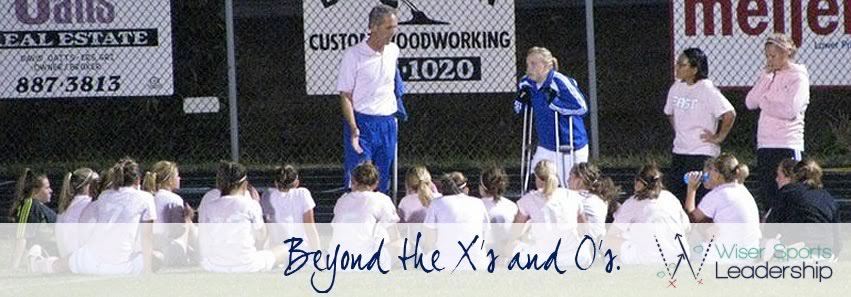April 2, 2017 ·
DeAngelo Wiser
·
Uncategorized
DeAngelo Wiser
Players face many challenges throughout their careers, but none are greater than the questions that race through their minds creating doubt and anxiety. How can they deal with it all? Should they avoid them, push them back, only to face them another day?
Often the questions listed below can keep a player from achieving their dream and realizing how good they can become. There will always be questions along the way. Some remind players to get back on track, while others place doubt in their minds over their dedication, ability, and determination.
Let’s take a look at some of the questions and advice a coach could share with their players:
WHY DO I PLAY? After a tough practice, preseason conditioning, injury or a heartbreaking loss, it’s natural to ask why you play the game. Why subject yourself to such punishment and despair? Is it worth it? Take a moment and visit those special memories you created with teammates and the positive moments shared along the way. It only takes a few to let you know why you play.
DO I HAVE WHAT IT TAKES? As you progress from high school to college you may find out quickly that your skill is matched or below your teammates and opponents. Are you as good as you can be? Have you honestly pushed yourself? Probably not yet, so just be determined to improve every day. It won’t be easy, but it will be worth it. You know the answer, but are you really willing?
IF NOT TODAY WHEN? It’s easy to put things off until tomorrow. Champions refuse to do that. They understand that today is a gift for learning and improving. Tomorrow will have its own set of challenges to face. Don’t let yourself off the hook today by putting something off that should be worked on today. Look it in the eye, accomplish it and move on, you’ll be glad you did.
HAVE EXCUSES BECOME PART OF MY DAY? Have you ever caught yourself telling a teammate or coach you just didn’t feel good when in actuality there was nothing wrong? How about with an activity or skill that you didn’t feel comfortable with? Putting yourself in new game situations on the practice field that make you uncomfortable allows you to grow. Did you make an excuse to avoid it? Once you get started on an excuse path it gets easier and easier. Stay disciplined, avoid excuses and embrace tough situations.
CAN I LOOK IN THE MIRROR? At the end of the day, can you stand in front of the mirror and be proud of your efforts? It has nothing to do with winning and losing. It has everything to do with you giving an honest effort for yourself and your teammates. Only you can give a true assessment of your dedication and determination. One person we can never fool is ourselves.
WHAT IF I MAKE A MISTAKE? Mistakes are part of any game. By dwelling on this question and worrying about who’s watching, you highlight it and make it bigger than it is. If it’s the only thing you think of during a game, guess what? Mistakes will come your way. Great players make mistakes, but what they see is the reward and what can be accomplished beyond the mistakes. Focus on what you can control, your effort, not mistakes.
WHO CAN I TURN TO? Without someone to share your thoughts and feelings with, they suddenly consume every thought you have. Find a teammate or friend who will take the time to listen. They may not have any answers, and that’s okay. Just by sharing them you’ll be able to release some of the added pressure you were feeling. Great friends never quickly judge and understand you may not be seeking solutions.
CAN I MAKE AN IMPACT ON THIS TEAM? You may have another view of your role or what it could be on the team. When you’ve experienced success easily in high school and now not so much in college, doubt starts to build. Remember, you were recruited for a reason and mainly because of your ability or potential. It’s time to live up to that potential. Change your mindset and work on your game with passion and enthusiasm. Only you can decide whether the drive to improve is worth the effort required. Your teammates are counting on you.
HOW CAN I AVOID DOUBT/FEAR/ANXIETY? You may not be able to totally, but you can certainly reduce it. Envision yourself in shining moments where you make the perfect pass, big save, game winning goal, etc. Draw from all the successes in your career. When your image and focus are more on what you’ve accomplished and who and what you can become, doubt, fear and anxiety become smaller and smaller. Eventually those thoughts and questions will fade away.
HOW DO I GET BACK THE PASSION I HAD AS A LITTLE KID? No reason you can’t, but understand you’ve grown into a new person and player. Everyone thinks back to those days when we ran around the field freely with a love for the game. It brought us to where we are today. Keep those memories close and remember you have new responsibilities for yourself and your teammates, which can bring even greater rewards. Go ahead and embrace the game the way you did back then. It’s up to you.
Questions allow you to grow. They are your conscience asking, “Are you where you want to be, doing what you love, giving all you have, and being the person and player you are capable of?” The challenge is to not dwell on the questions, but to answer them and move past. You will always be the only one who knows if you answered them truthfully. When you do, it frees you up to play again with the passion you did as a kid.
I wish you the best!!
March 14, 2017 ·
DeAngelo Wiser
·
Uncategorized
DeAngelo Wiser
Athletic Directors are the most overlooked and overworked component of a sports program, especially at the high school and small college level. They are expected to do everything from sweeping the floor, taking up tickets and listen to every complaint with a smile, while getting little rest to repeat the process tomorrow. With that in mind this article is directed their way. Not to add to their list, but to emphasize how important their role is in developing new or inexperienced coaches.
A lot of time and resources can be devoted to training coaches. Various accredited organizations offer diplomas and licenses that open doors for many. Clubs and schools welcome coaches who have these credentials in with open arms, but where does your training originate?
One concern athletic directors hear about a new, inexperienced coach hired before the season begins is “They don’t know enough about the game.” That may be based on a practice observed, or someone’s opinion. Quite often it’s correct, but this aspect of technical and tactical coaching is more readily solved with courses, seminars, webinars, clinics and even a veteran assistant.
What about leadership? Do you have a program within your sports department to develop and teach new coaches leadership skills? Some of the biggest challenges a coach faces are not technical or tactical aspects of the game, they’re leadership related.
Hiring a technically sound coach who is a student of the game is easily detected. However, it doesn’t always guarantee they know how to lead a team or deal properly with challenges.
 Some of the biggest challenges come from:
Some of the biggest challenges come from:
· Playing time
· Accountability
· Motivation
· Parents
· Academics
· Bringing a team together
· Handling adversity/success
· Building a program
Given a choice, would coaches rather deal with specific aspects of the game or the above mentioned? Most coaches love the game and thoroughly enjoy teaching technical and tactical areas. There is nothing more rewarding than seeing a player apply a learned skill for success in a game. But what about the leadership skills needed to lead a team? There will be days coaches are mired in mountains of psychological issues brought on by selfishness, behavior, parents, and many more. Are they equipped to handle it?
When thrown into a sea of challenges without any training, their only recourse is:
· Ask other coaches if time permits.
· Do what they feel is right at the time.
Other coaches can give them great insight from experience and offer solutions, but is the situation exactly the same? And doing what they think is right may seem like the best idea at the time, but without experience can they know all the areas impacted? Remember a well meaning and beneficial national organization can train our coaches to a certain degree, but will they be responsible if something goes wrong? We would all agree the answer is no.
Let’s think about some ways to better prepare coaches:
· Do you have a clear list of expectations for your coaches with respect to how they work and deal with parents and players?
· Are you involved in their training, or is it just meeting to hand out information and forms?
· How often is the training? What does the curriculum cover?
· Are you proactive using issues on the local or national level for training?
· Are media training and social media included in the training?
· Is there discussion or dialogue about what problems they’ve encountered this week?
· Do coaches attend student leadership council to answer questions and talk about their program?
· Have you prepared a list of potential issues or situations that each coach has to answer and present to his or her peers, followed by discussions?
· How about role playing situations to bring them to life?
· What recommendations or suggestions would they have for a new coach?
It’s not just about fulfilling certain obligations concerning state or local standards. Checking criteria off a list doesn’t guarantee that a coach knows every expectation you have for him or her. Only by training them personally can you feel confident you’ve done everything possible to help them succeed.
Here are three programs you may consider to supplement your training with newly hired or inexperienced coaches:
MENTORSHIP PROGRAMS
40 over 40
30 under 30 programs highlighting and gaining insight from younger coaches concerning challenges and their intuition are quite the rage. How about veteran coaches, those who are 40 and older with vast experience? This is truly an untapped resource overlooked by national and state organizations. Many of these coaches are retired, highly successful, but still have so much to offer the game that consumed so much of their lives.
In the coaching world, and I know in your school or area, there are plenty of retired or older coaches who could act as a mentor for your newly hired coach. Just having a mentor for a season could make a huge difference whether an outstanding new coach continues his or her career or leaves due to their inability to deal with the challenges. It is a win/win situation with the retired or older coach feeling good to give something back to the institution and program and the young coach being happy to have someone to lean on, and not feeling their job is threatened. The key is finding a positive mentor who still has a passion for sports, wants to contribute, and can leave a small legacy with the young coach. The parameters and scope of this program could be developed through an athletic committee or the AD.
USMC
A model used by the USMC may be worth looking at. When an officer graduates from Officer Candidate School, he or she is commissioned as a 2nd Lieutenant. They will eventually lead a platoon. Up to this point their career has been focused on class work and simulated situations with little actual experience. Within their platoon is a veteran sergeant who has experience in combat situations and certainly has seen every side the military has to offer with respect to the dynamics of a platoon. That experience will be vital to the new officer in making decisions for the welfare of their group. Pairing your new coach up with a battle tested veteran assistant could help get them through that first critical season.
INTERNSHIP
An Internship Program may be another idea to consider. School systems usually place a newly hired teacher with a more experienced one. The experienced teacher volunteers and is compensated for the assignment, so it’s someone who genuinely wants to help the new teacher in that critical first year. Criteria must be met, there are observations, and data must be collected for the new teacher to retain their job.
Placing a newly hired coach with little experience with a veteran coach could make a huge difference in their career. The biggest key is finding other coaches who will help build your school’s sports programs and are willing to help others. It would be necessary for the veteran coach to be in his or her off season during the internship so they could give full attention to the new coach.
Developing the curriculum, what criteria is crucial, observations and evaluations, will all play a critical role in the program’s success.
Finding ways to keep that dynamic young coach on track should be a goal for all of us. They’re good for the game and players, bringing energy and unbridled enthusiasm, but most of all they deserve our full support.
Your program needs that youthful energy and enthusiasm to drive the team to new heights. It also needs that veteran riding shotgun looking for bumps in the road.
I wish you and your team the best!
January 23, 2017 ·
DeAngelo Wiser
·
Uncategorized
DeAngelo Wiser
Be yourself
Use all the God given attributes you have with your team.
Use the light that shone for you.
Apply the best characteristics/traits from your high school/college coach/parents/minister/teacher/mentor. Ask yourself, How would they handle this situation? Don’t be reluctant to call them.
Be able to sleep at night.
Exhibit character and integrity in everything you do- Do what is right regardless of the player or situation.
Inspire through your example
Outwork your team in preparing for practice, games, trips and meetings. Show them you’re prepared at all times.
Trust those around you
Challenges and distractions will take a huge amount of your time. Delegate.
Be what you hope to see
Be positive, encouraging and enthusiastic. Remember you set the tone.
You get what you allow
Biggest complaint I hear from former players is “These players won’t do what I say, or they are lazy.” Remember you set the tone.
Stay on your path
Don’t let one bad moment by one player define your practice or a game, remain focused on so many who count on you. There will be time to talk later.
Be willing to hire someone who could take your place.
Hire an assistant coach who isn’t like you, and not afraid to question your decisions. If you both always agree one of you isn’t necessary.
Step to the front if you lose, and to the back in a win.
Always give your team credit for success and always take the blame for losses or bad times.
Impacting players lives in a positive way should be your goal.
Coaching is about moments, not championships and trophies. Every day you’ll have that opportunity.
Listen with the intent to hear and understand.
Allow someone to vent, you don’t have to win every battle.
Listening is one of the most important skills you’ll need in this profession.
Reflections
Everything you and your team do is a reflection of the school, your family and yourself. Remind yourself even in the toughest of times.
Be willing to step up and lead
Decisions will be a big key in how effective you’ll be with your team- players are watching and recording how you handle it.
Build decision makers
Whenever possible allow players to make decisions on the field or court. There will be many times when this is necessary. Take away their complete dependence on you.


 Some of the biggest challenges come from:
Some of the biggest challenges come from: